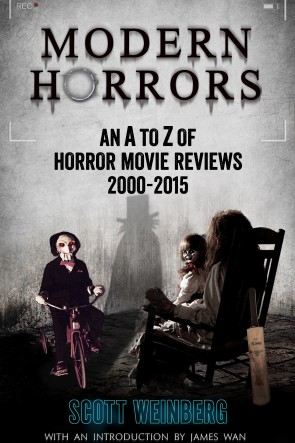Review: HAUNTER (2013){0}
I look forward to a new Vincenzo Natali movie like most movie geeks anticipate the next feature from Steven Spielberg or Martin Scorsese. Ever since I stumbled across his 1997 debut film Cube, which still stands up (despite its lesser sequels) as a very novel approach to cerebral horror or dark fantasy or violent sci-fi… I’m not exactly sure. From there he made Cypher (2002), Nothing (2003), and Splice (2009), all of which are (A) cool, (B) creepy, or (C) a combination of cool and creepy. So it was with much enthusiasm that I leapt into Mr. Natali’s latest effort, the haunted house story known simply as Haunter.
Already I can hear what you’re thinking: another haunted house movie? My response is a loud “yep!” because, hey, if we’re going to get endless permutations on the sub-genre (including everything Paranormal Activity, Insidious, and Sinister), we may as well shine a light on the most creative ones. Thanks to a wonderfully clever screenplay by Brian King, a great ensemble cast, and Mr. Natali’s deft touch where standard genre conventions are concerned, Haunter stands as one of the most interesting (and admirably sedate) haunted house indies in quite some time. (It’d actually make for a rather compelling double feature with Livid, truth be told.)
Haunter starts simply enough before expanding into some sort of fascinating little puzzle box of a movie: unhappy teenager (Lisa) has come to realise that she and her family are dead. Ghosts, to be more precise, although her mom, dad, and little brother clearly have no idea that they’ve been deceased and reliving the exact same day for an unknown period of time. It’s a simple enough reversal – the ghosts are the main characters, the living are virtually invisible – that propels Haunter from a quietly compelling first act into a story that gets decidedly more complicated (and much creepier) as it goes on.
Not only does poor Lisa (a seriously excellent Abigail Breslin) have to convince her family that they are ghosts, but she also has to figure out why they’re all ghosts, plus there’s an evil spirit wandering around, an eternal expanse of foggy mist outside, and a bunch of hidden passages and secret doors tucked around the eerie edifice. Oh, and of course her little brother has an “imaginary” friend. For a slow-burn ghost story that runs about 100 minutes and stays completely in one location, Haunter covers a lot of ground – and it does so with a high degree of class, craftsmanship, and obvious respect for the true classics of the haunted house sub-genre.
It’s not just King’s deftly-layered and slyly contorted screenplay or Jon Joffin’s frankly beautiful cinematography that makes Haunter such an interesting little “throwback” thriller. Natali and editor Michael Doherty seem intent on playing games with their viewers, and only those who have a lot of experience with haunted house movies will be able to glean a few early clues. Even as Haunter gets a little more complicated (Lisa becomes sort of a guardian ghost to another teenage girl), it manages to remain enjoyably cohesive. The pieces all come together, but you may have to be a patient horror fan to enjoy the final payloads.
In addition to Ms. Breslin’s fascinating and completely appealing performance as Lisa, there’s also some great work from the effortlessly insidious Stephen McHattie (as an unkind presence), as well as Peter Outerbridge and Michelle Nolden as Lisa’s kind but clueless parents. Simply put, there’s a lot to like about Haunter. It works as a sly deconstruction of ghost stories and a laid-back compilation of all the things we enjoy most about haunted house movies. Astute horror fans will notice some DNA from The Haunting, The Innocents, The Shining, and evenBeetlejuice in Haunter, and yet it still holds up as one of the more creative cinematic ghost stories of the past several years.
Scott Weinberg








